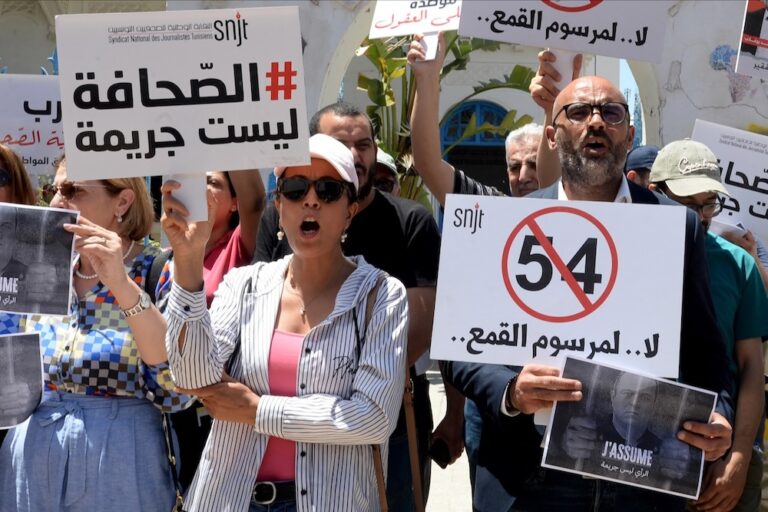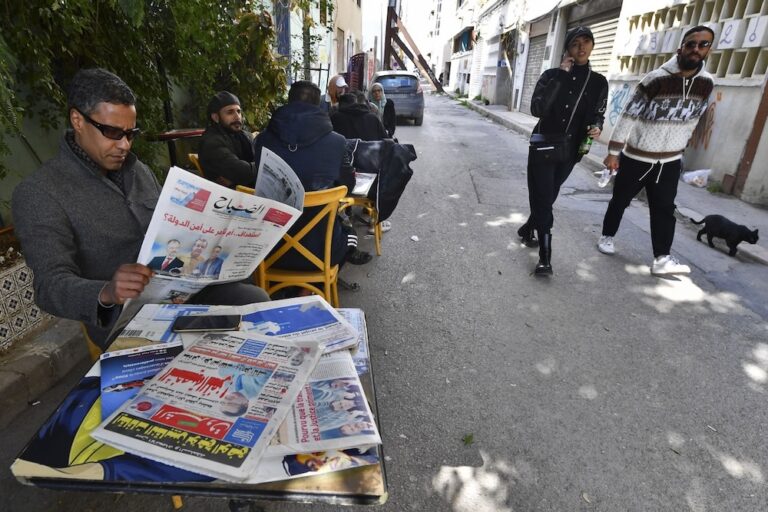(IFLA/FAIFE/IFEX) – The following is an IFLA/FAIFE media release: IFLA/FAIFE protests against restrictions on freedom of access to information in Tunisia in the run up to the World Summit on the Information Society IFLA/FAIFE urges the Tunisian government to take steps to increase freedom of access to information in the country by removing restrictions on […]
(IFLA/FAIFE/IFEX) – The following is an IFLA/FAIFE media release:
IFLA/FAIFE protests against restrictions on freedom of access to information in Tunisia in the run up to the World Summit on the Information Society
IFLA/FAIFE urges the Tunisian government to take steps to increase freedom of access to information in the country by removing restrictions on the circulation of books and information on the Internet imposed by its policies, says the Chair of the IFLA/FAIFE Committee, Professor Paul Sturges.
The International Federation of Library Associations and Institutions’ (IFLA) Committee on Free Access to Information and Freedom of Expression (IFLA/FAIFE) expresses its deep concern over the state of freedom of access to information in Tunisia in the run up to the second phase of the World Summit on the Information Society (WSIS), which will be held 16-18 November in Tunis. In building a robust and equitable information and knowledge society, it is crucial to safeguard unhampered access to information resources across borders, for all people, without restriction. The World Summit on the Information Society has embraced the principles of Article 19 of the UN Universal Declaration of Human Rights, but Tunisia continues to restrict its citizens’ freedom of access to information through censorship and the stifling of freedom of expression on the Internet.
His Excellency President Ben Ali announced on 27 May 2005 that the legal submission procedure applicable to the press would be abolished. IFLA welcomes this announcement but is concerned at reports from the International Freedom of Expression Exchange (IFEX) Tunisia Monitoring Group (1) that the authorities continue to use legal means to prevent a large number of books from freely circulating in the country.
Furthermore, IFLA/FAIFE expresses its grave concern that Tunisian authorities have used the Law on Terrorism passed in December 2003 as a tool to silence and punish critics of the government. The attitude of the Tunisian government towards the circulation of information is one that cannot be reconciled with the aspirations of the nations attending the World Summit on the Information Society.
Only by upholding the principles of intellectual freedom and guaranteeing the rights of its citizens can the Tunisian authorities demonstrate their commitment to full participation in the information and knowledge society. This means providing unrestricted access to information in accordance with Article 19 of the Universal Declaration of Human Rights – before and after the Tunis Summit.
IFLA/FAIFE therefore urges the Tunisian government to take steps to increase freedom of access to information in the country by removing restrictions on the circulation of books and information on the Internet. We also support colleagues in Tunisia fighting to safeguard the right of library users to freedom of access to information.
END
BACKGROUND
Censorship of books
A large number of books on diverse subjects including human rights and democracy are being censored as a result of the existing system of legal submission for Tunisian publishers. Publishers must deposit copies of new books with the Ministry of Culture, the National Library, the Ministry of the Interior and the Public Prosecutor’s Office. A receipt issued by the Ministry of the Interior then allows the distribution of the books within the country. In reality the receipts are rarely forthcoming, leaving books to languish unpublished and restricting citizens’ freedom of access to information. IFEX reports that the system has been in place for at least ten years, leading to the censorship of books by notable advocates of intellectual freedom such as Mohamed Talbi and Moncef Marzouki. Other books are banned if they are suspected of being edited by centres or groups engaged in scientific research and human rights education, such as the Temimi Foundation, the Arab Institute for Human Rights (AIHR) and the Tunisian Association of Democratic Women (ATFD).
Governmental control of the Internet
Following the Tunisian government’s nationalisation of the country’s Internet Service Providers in 2004, the content of websites is regulated in accordance with government policy. The websites of political opponents have been banned, along with resources on human rights and free email websites such as Hotmail. Complementing this approach is a system of strict Internet surveillance whereby users’ online activities are monitored by a special ‘Cyber-police’ force set up by the government to investigate ‘over-active’ Internet users, and those who visit sites the government considers subversive. Simply viewing certain websites can lead to imprisonment under Tunisian law. Following the aftermath of the September 11th terrorist attacks in the United States the Tunisian government has been cracking down on users they claim to be accessing ‘terrorist-related’ websites, a wide ranging definition that has led to the arrest and imprisonment of Internet users in the past two years.
Violations of intellectual freedom
The elimination of freedom of access to information and freedom of expression deeply affects the development of the country and its people. Freedom of access to information, knowledge and lifelong learning is central to democratic development and active participation and influence in society and when these fundamental human rights are violated in Tunisia or elsewhere the international library community must react. The IFEX Tunisia Monitoring Group is calling for an end to all attacks on freedom of expression in Tunisia. IFLA/FAIFE declares its support for this appeal.
1. (The International Freedom of Expression Exchange – Tunisia Monitoring Group consists of: Article 19, UK; Canadian Journalists for Free Expression (CJFE); Egyptian Organization for Human Rights (EOHR); Index on Censorship, UK; International Federation of Journalists (IFJ); International Publishers’ Association (IPA), Switzerland; Journaliste en Danger (JED), Democratic Republic of Congo; Media Institute of Southern Africa (MISA), Namibia; Norwegian PEN; Writers in Prison Committee of International PEN (WiPC), UK; World Association of Newspapers (WAN), France; World Press Freedom Committee (WPFC), USA; World Association of Community Radio Broadcasters (AMARC))


